
First, a look at what causes bad breath
It’s no secret that certain foods don’t do your breath any favors. John C. Comisi, DDS, at Dental Care with a Difference, PC in Ithaca, New York, suggests limiting foods that are associated with causing malodorous oral-related conditions. “Garlic, onions, coffee, alcohol, meats, juices, and carbonated beverages are just a few of the foods and drinks linked to bad breath,” he says. “The breath odor is most commonly created by volatile sulfur compounds that can be found in many of these items or that can be created when these are ingested.” Not following a proper oral hygiene routine, which includes regular dental visits, can contribute to the problem. “Fresh breath starts with a healthy and clean mouth,” says Ana Gourlay, an herbalist at Sunflower Natural Foods in Laconia, New Hampshire. Gourlay, who holds a master’s degree in natural health as well as a certificate in advanced herbal studies, says there are many ways to freshen your breath naturally. Here’s a closer look at the foods and drinks that naturally freshen your breath—and keep your mouth healthy to boot.
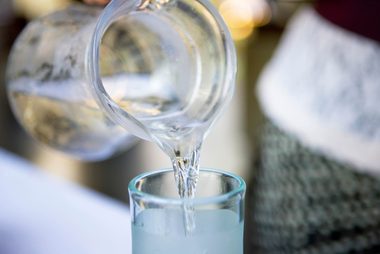
Drink more water
You already know that drinking water is beneficial. After all, water keeps you hydrated, doing everything from boosting brain health to improving skin’s elasticity. But it also acts as a great natural breath freshener. Drinking water helps flush away odor-causing bacteria that thrive in a dry mouth. Dr. Comisi adds that consuming sufficient amounts of water daily helps to “free up food items on the tongue.” This, in conjunction with properly taking care of your teeth and mouth, reduces the accumulation of bad breath-causing particles that can become trapped in your mouth. These genius hacks can get you drinking more water on the regular.
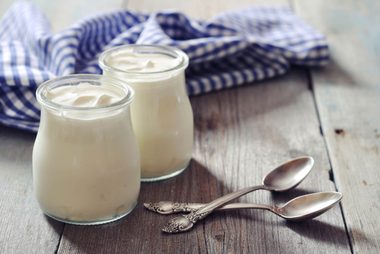
Choose fortified, probiotic-filled yogurt
Most yogurts contain some probiotics, but Dr. Comisi suggests looking for labels that specify “fortified with vitamin D” and “contains probiotic bacteria.” Probiotics, he explains, are the good bacteria that can “help to change the balance of power” in your mouth from “a bad bacteria population to a good one.” Healthy populations of “good” bacteria will naturally freshen your breath. Gourlay says that some companies even make probiotic lozenges specifically to help maintain healthy oral bacteria. These are many other ways that probiotics are good for your body.

Get a milk mustache
In addition to fortified yogurt, milk—both fat-free and whole—has been found to fight bad breath. We can thank milk’s fat and water content for breath freshening ability, particularly when garlic is the culprit, according to eatthis.com. Beating bad breath aside, milk has some more surprising benefits.
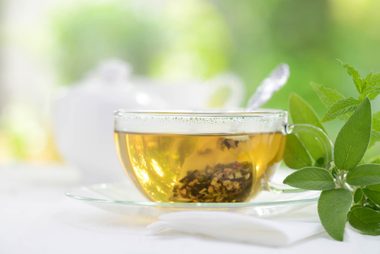
Guzzle green tea
Research has shown that green tea contains polyphenols to help naturally freshen breath, according to eatthis.com. Add the fact that it can also play a role in preventing tooth decay, fight certain kinds of mouth cancers, and boost your weight-loss efforts, and you’ll definitely want to make green tea a must-sip drink. Here are more of green tea’s amazing health benefits.
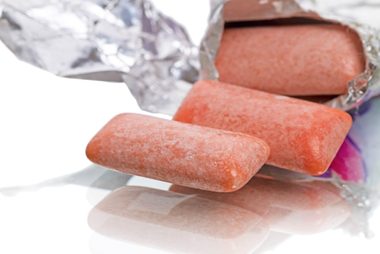
Look for gum and mints with xylitol
Reach for gum that contains xylitol, a sugar alcohol that doesn’t feed bacteria. “It may create a slippery coating on teeth and gums which keeps bacteria from adhering,” Gourlay says. Dr. Comisi suggests enjoying the recommended amount of a xylitol-containing mint or gum for about five minutes after each meal. Don’t fret about the chemical-sounding name; Now Foods explains that our bodies naturally produce certain amounts of xylitol. Plus, it’s a low-glycemic food that doesn’t promote dental cavities. Just watch that your furry friends don’t get into the xylitol. While it’s safe for humans, it can be harmful or even deadly when ingested by animals.
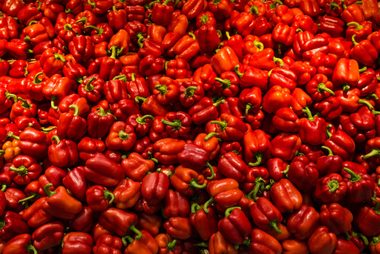
Crunch some raw red bell pepper
Dr. Comisi explains that vitamin C-rich foods, like red bell pepper, are great when it comes to keeping bad breath at bay (broccoli’s another good choice). “Eating raw red bell pepper and broccoli, which contain good amounts of vitamin C, reduces the bacteria populations associated with mouth odor,” he says.
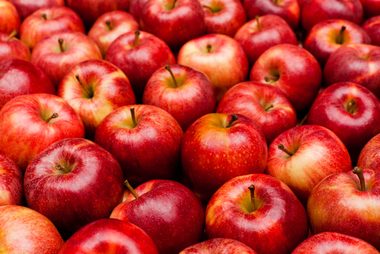
Eat an apple a day
If you love garlic, turn to a raw apple to keep your breath pleasant. A raw apple neutralizes the inevitable mouth odors than arise when you eat raw garlic. In fact, a study published in the 2016 issue of Journal of Food Science confirms the power of a raw apple to combat offensive breath caused by garlic. When participants consumed garlic and were given raw, heated, or juiced apple (one of the many foods tested in the study), those who ate raw apple had significantly reduced bad breath within 30 minutes. Raw lettuce also did the trick, according to the study.
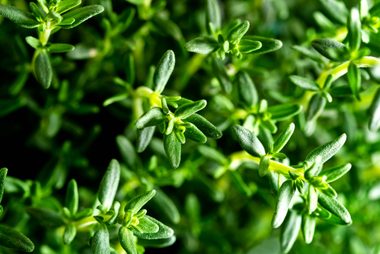
Go herbal
Try turning to tea tree, thyme, oregano, clove, cinnamon, and cardamom to tame toxic breath. “Chewing some leaves or a pod of these herbs would help freshen breath,” Gourlay explains. “Green herbs should be fresh, as some of the volatile oils are lost when they are dried.” Parsley, basil, and mint are also beneficial herbs that play a role in beating foul mouth odors into submission. With these gardening tips, you can grow your own breath-freshening herbs.
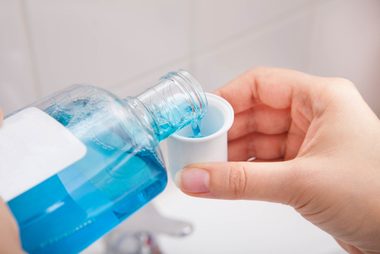
What about mouthwash?
Gourlay warns against mouthwashes that contains alcohol because it dries gums and also increases the chances of infection. Instead, she suggests choosing natural oral care products that contain the likes of tea tree, clove, cardamom, oregano, or thyme, all of which can play a role in naturally fending off foul mouth odor. If you’re hankering for a commercial rinse, Dr. Comisi recommends PeriActive, an alcohol-free oral rinse that works together with a combination of three botanical ingredients (Sambucus, Echinacea purpurea, and Centella asiatica) to calm any inflammation and enhance natural oral healing. He believes the rinse has been beneficial for his patients, noting that it’s helped freshen their breath while simultaneously giving their overall oral health a significant boost.
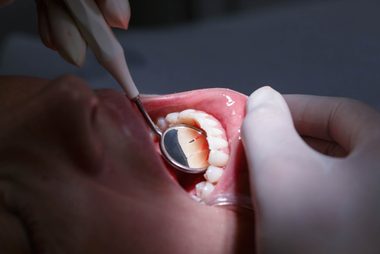
When bad breath is something more serious
So, what if your bad breath simply isn’t going away? Dr. Comisi says that persistent bad breath could be linked to an underlying health problem. If you still have bothersome odors coming from your mouth even after working with your dentist on a possible treatment plan, visit your primary physician to assess what other causes may be a hand. Here’s what your bad breath could be trying to tell you.
